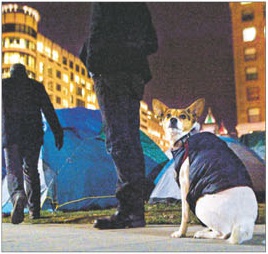This forum is disabled, please visit https://forum.opencv.org
 | 1 | initial version |
here is my code adopted from squares.cpp. it finds appropriate quad areas and crop them.
the result images
 ![image description]
(/upfiles/143314691748202.jpg)
![image description]
(/upfiles/143314691748202.jpg)
#include "opencv2/imgproc/imgproc.hpp"
#include "opencv2/highgui/highgui.hpp"
#include <iostream>
using namespace cv;
using namespace std;
// helper function:
// finds a cosine of angle between vectors
// from pt0->pt1 and from pt0->pt2
static double angle( Point pt1, Point pt2, Point pt0 )
{
double dx1 = pt1.x - pt0.x;
double dy1 = pt1.y - pt0.y;
double dx2 = pt2.x - pt0.x;
double dy2 = pt2.y - pt0.y;
return (dx1*dx2 + dy1*dy2)/sqrt((dx1*dx1 + dy1*dy1)*(dx2*dx2 + dy2*dy2) + 1e-10);
}
// returns sequence of squares detected on the image.
// the sequence is stored in the specified memory storage
static void findSquares( const Mat& image, vector<vector<Point> >& squares , bool inv=false)
{
squares.clear();
Mat gray,gray0;
vector<vector<Point> > contours;
cvtColor(image,gray0,COLOR_BGR2GRAY);
gray = gray0 >= 240;
if (inv)
gray = gray0 <= 10;
// find contours and store them all as a list
findContours(gray, contours, RETR_LIST, CHAIN_APPROX_SIMPLE);
vector<Point> approx;
// test each contour
for( size_t i = 0; i < contours.size(); i++ )
{
// approximate contour with accuracy proportional
// to the contour perimeter
approxPolyDP(Mat(contours[i]), approx, arcLength(Mat(contours[i]), true)*0.02, true);
// square contours should have 4 vertices after approximation
// relatively large area (to filter out noisy contours)
// and be convex.
// Note: absolute value of an area is used because
// area may be positive or negative - in accordance with the
// contour orientation
if( approx.size() == 4 &&
fabs(contourArea(Mat(approx))) > 500 &&
isContourConvex(Mat(approx)) )
{
double maxCosine = 0;
for( int j = 2; j < 5; j++ )
{
// find the maximum cosine of the angle between joint edges
double cosine = fabs(angle(approx[j%4], approx[j-2], approx[j-1]));
maxCosine = MAX(maxCosine, cosine);
}
// if cosines of all angles are small
// (all angles are ~90 degree) then write quandrange
// vertices to resultant sequence
if( maxCosine < 0.3 )
squares.push_back(approx);
}
}
}
int main( int argc, char** argv )
{
vector<vector<Point> > squares;
Mat image = imread(argv[1], 1);
if( image.empty() )
{
cout << "Could not open or find the image" << endl ;
return -1;
}
findSquares(image, squares);
if (squares.empty())
findSquares(image, squares,true);
if (squares.empty())
{
cout << "Could not find any result" << endl ;
return -1;
}
// shows all the squares in the image
for( size_t i = 0; i < squares.size()-1; i++ )
{
Rect r=boundingRect( Mat(squares[i]));
Mat s= image(r);
stringstream temp_stream;
temp_stream << argv[1] << " - "<< i << ".jpg";
imwrite(temp_stream.str(),s);
imshow(temp_stream.str(),s);
}
waitKey(0);
return 0;
}
 | 2 | No.2 Revision |
here is my code adopted from squares.cpp. it finds appropriate quad areas and crop them.
the result images
 ![image description]
(/upfiles/143314691748202.jpg)
![image description]
(/upfiles/143314691748202.jpg)



#include "opencv2/imgproc/imgproc.hpp"
#include "opencv2/highgui/highgui.hpp"
#include <iostream>
using namespace cv;
using namespace std;
// helper function:
// finds a cosine of angle between vectors
// from pt0->pt1 and from pt0->pt2
static double angle( Point pt1, Point pt2, Point pt0 )
{
double dx1 = pt1.x - pt0.x;
double dy1 = pt1.y - pt0.y;
double dx2 = pt2.x - pt0.x;
double dy2 = pt2.y - pt0.y;
return (dx1*dx2 + dy1*dy2)/sqrt((dx1*dx1 + dy1*dy1)*(dx2*dx2 + dy2*dy2) + 1e-10);
}
// returns sequence of squares detected on the image.
// the sequence is stored in the specified memory storage
static void findSquares( const Mat& image, vector<vector<Point> >& squares , bool inv=false)
{
squares.clear();
Mat gray,gray0;
vector<vector<Point> > contours;
cvtColor(image,gray0,COLOR_BGR2GRAY);
gray = gray0 >= 240;
if (inv)
gray = gray0 <= 10;
// find contours and store them all as a list
findContours(gray, contours, RETR_LIST, CHAIN_APPROX_SIMPLE);
vector<Point> approx;
// test each contour
for( size_t i = 0; i < contours.size(); i++ )
{
// approximate contour with accuracy proportional
// to the contour perimeter
approxPolyDP(Mat(contours[i]), approx, arcLength(Mat(contours[i]), true)*0.02, true);
// square contours should have 4 vertices after approximation
// relatively large area (to filter out noisy contours)
// and be convex.
// Note: absolute value of an area is used because
// area may be positive or negative - in accordance with the
// contour orientation
if( approx.size() == 4 &&
fabs(contourArea(Mat(approx))) > 500 &&
isContourConvex(Mat(approx)) )
{
double maxCosine = 0;
for( int j = 2; j < 5; j++ )
{
// find the maximum cosine of the angle between joint edges
double cosine = fabs(angle(approx[j%4], approx[j-2], approx[j-1]));
maxCosine = MAX(maxCosine, cosine);
}
// if cosines of all angles are small
// (all angles are ~90 degree) then write quandrange
// vertices to resultant sequence
if( maxCosine < 0.3 )
squares.push_back(approx);
}
}
}
int main( int argc, char** argv )
{
vector<vector<Point> > squares;
Mat image = imread(argv[1], 1);
if( image.empty() )
{
cout << "Could not open or find the image" << endl ;
return -1;
}
findSquares(image, squares);
if (squares.empty())
findSquares(image, squares,true);
if (squares.empty())
{
cout << "Could not find any result" << endl ;
return -1;
}
// shows all the squares in the image
for( size_t i = 0; i < squares.size()-1; i++ )
{
Rect r=boundingRect( Mat(squares[i]));
Mat s= image(r);
stringstream temp_stream;
temp_stream << argv[1] << " - "<< i << ".jpg";
imwrite(temp_stream.str(),s);
imshow(temp_stream.str(),s);
}
waitKey(0);
return 0;
}